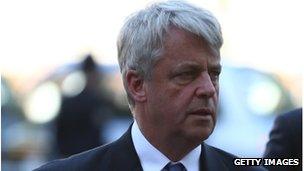Charities force anti-lobbying laws rethink
- Published

Andrew Lansley made the concessions after talks with a body representing voluntary organisations
Ministers have amended their plans for new anti-lobbying laws after charities warned the bill could affect their ability to campaign.
The government has tabled a series of amendments to the legislation and will scrap plans to change the way campaign spending by organisations is defined.
Commons Leader Andrew Lansley said he was "very glad" to meet the concerns of charities and voluntary organisations.
A cross-party committee of MPs earlier said the bill was "seriously flawed".
The bill was intended to improve transparency and boost public confidence in politics.
It was published in July following allegations about the influence of lobbyists on government decision-making and the involvement of peers and MPs with lobbying groups.
The legislation would have set a £390,000 cap on the amount any organisation - excluding political parties - could spend across the UK during elections.
But it was met with a public outcry. Oxfam, the Royal British Legion and the Salvation Army said it was so complex, it was "impossible" to follow.
The Electoral Commission warned there were "significant issues of workability" and the TUC suggested it might even stop them from holding their annual conference.
In a report, published on Thursday, the cross-party Political and Constitutional Reform Committee said the reforms were "flawed" and "unnecessarily rushed", and suggested they were withdrawn for six months while they were improved.
Committee chairman and Labour MP Graham Allen said: "This bill is an object lesson in how not to produce legislation."
'As clear as possible'
Commons Leader Mr Lansley made the concessions after talks with the National Council for Voluntary Organisations (NCVO), which had been a leading critic.
Afterwards, Mr Lansley said: "I heard what the charities and voluntary organisations had to say.
"While we always were clear that we had no intention of preventing them campaigning on policies and issues as they always have, I wanted the bill to be as clear as it could possibly be.
"So I am very glad that I have been able to meet the concerns of voluntary organisations, while ensuring that the bill still regulates effectively when organisations directly try to promote election candidates and parties."
Sir Stuart Etherington, the chief executive of NCVO, said he was pleased the government had listened and "significantly met" the concerns of charities and community groups.
However, TUC general secretary Frances O'Grady said the problems with the bill had not gone away as it still limited campaigns against extremist parties, breached the privacy of trade union members and failed to open up lobbying.
"If ministers think that opposition will now melt away, they have another thing coming," she added.
On Monday, the House of Commons approved the legislation - called the Transparency of Lobbying, non-Party Campaigning, and Trade Union Administration Bill - in principle by giving it a second reading, with 309 votes in favour to 247 against - a reduced government majority.
- Published5 September 2013
- Published3 September 2013
- Published23 August 2013
- Published19 August 2013
- Published3 June 2013